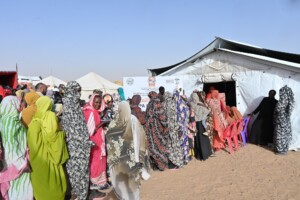‘Sudan’s economic policies a disaster, hunger looming’: opposition
The economic crisis and the current food shortages in Sudan are the “natural consequences of devastating policies” says the Umma Party. A leading economist predicts hunger in large parts of the country.
The economic crisis and the current food shortages in Sudan are the “natural consequences of devastating policies” says the National Umma Party (NUP) as the hard currency rates at the black market are on the rise again. According to a leading Sudanese economist, the decline in exports, the main source of foreign currencies, lies at the heart of the problem. He predicted “a significant degree of hunger in large parts of the country”.
The rate of US Dollar against the Sudanese Pound hit SDG11.50 at the ‘parallel market’ in Sudan's capital on Monday. The price of the Saudi Riyal rose to SDG3.10, with expectations of a further increase. The official US Dollar rate stands fixed at about SDG6, while the Saudi Riyal is officially sold at a little more than SDG1.6 today.
The so-called empowerment policies of the National Congress Party (NCP) have only led to the misuse of public money, the NUP said in a statement on Tuesday.
“The policies opened the doors to an uncontrollable corruption which led to a lower production, the rise of unemployment figures, and an increased poverty. [..] The measures adopted by the ruling party have led to the waste of the country’s resources and in particular the oil revenues, amounting to SDG80 billion ($13 billion).”
According to the NUP these conditions have transformed life in Sudan into “an unbearable hell”, causing a mass immigration to Khartoum state, and “from there to all the four directions of the world”.
Declined production, exports
Siddig Kabello, economist and member of the Communist Party's Central Bureau attributed the economic and financial crises to the declined production.
In an interview with Radio Tamazuj on Monday, Kabello blamed the ruling National Congress Party (NCP) of destroying the production capacity since it came to power. “The Khartoum government is responsible for the destruction of El Gezira agricultural scheme, the textile industry, the railways, and many other projects”.
Kabello explained that exports are the main source of foreign currencies. “Though the agricultural exports have increased from 921 million to more than one billion during the past few years, the Sudanese exports cannot cover the decline in the oil and even the gold exports.”
The Sudanese exports in the first half of 2014 amounted to $2 billion and 439 million, but decreased in the second half to $1 billion and 790 million, according to a government report.
The economist ruled out the possibility of economic reforms under the current government. “A solution is only possible with a new transitional government. This government squanders money in war and to 3,226 constitutional post holders, so it is impossible to solve the crisis,” he said.
Hunger
He predicted “a significant degree of hunger soon” across Sudan, and urged “all activists and media to inform the international community about the food crisis so that they will able to provide urgent aid assistance before the humanitarian situation worsens further”.
Subsidies
The prices of basic commodities may rise again next year when the Sudanese Parliament to endorses the government’s plan to introduce new cuts to subsidies on basic goods and services in next year's budget.
The subsidy cuts on wheat, electricity, and fuel will enable the government to direct funds to other productive sectors, in order to bring the country out of the current “economic bottleneck” and “distress” currently experienced by the Sudanese people, Finance Minister Badreldin Mahmoud said in remarks before the federal Parliament on Monday.
He urged the national and state Parliaments to increase productivity, and transform Sudan “from a consuming nation to a producing country”.
The 2016 budget aims to reduce inflation and imports, direct more resources to agricultural production, and boost non-oil revenues.











 and then
and then